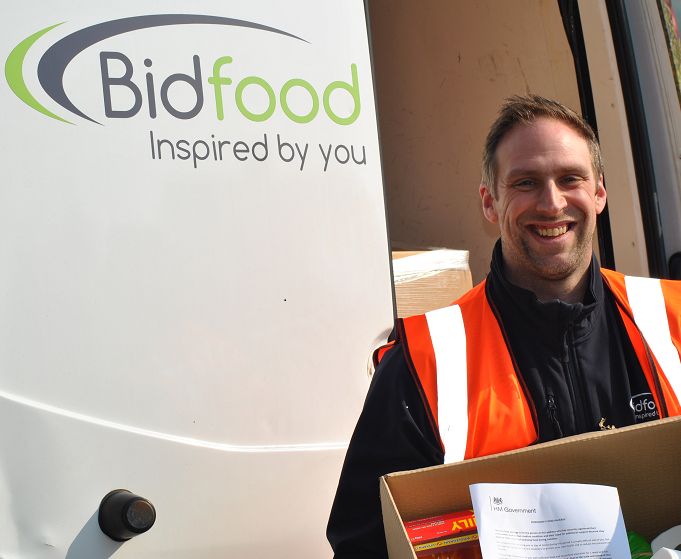The UK’s leading
food service companies, Brakes and Bidfood, have joined forces to support a new government initiative to ensure that vital food supplies reach the country’s most vulnerable people during the coronavirus crisis. Starting this week, the initiative will see the two companies working together to deliver potentially hundreds of thousands of weekly care packages across the country to people at high risk from the virus who are not able to get easy access to food at this challenging time. In a joint statement from Andrew Selley and Hugo Mahoney, CEOs of Bidfood and Brakes, the companies confirmed their involvement: “During this national crisis, Bidfood and Brakes, the UK’s largest wholesalers, have joined forces to deliver weekly food and essential supply boxes to many of the 1.5m extremely vulnerable people in isolation. Moving at record pace, we have worked with government departments to create a service capable of reaching every corner of England, through our national depot networks. Our security-checked, professional delivery drivers are hugely motivated and proud to be playing their part in serving their local communities in this fantastic endeavour.” The food box delivery scheme for the extremely vulnerable has now also been rolled out by governments in Wales and Scotland. Those in high risk groups in Scotland and Wales are able to register for the deliveries through their local authority. The government’s directive to temporarily close many foodservice outlets like pubs and restaurants means that both businesses are able to redirect some of their experienced teams to delivering care boxes across the country. Initial deliveries have already begun over the weekend. The parcels, which will be delivered to the doorstep, will contain more than 20 essentials including pasta, cereal, tea bags, fresh and tinned fruit, milk, bread and biscuits, as well as non-food items like toilet rolls and shower gel. Since Monday, 900,000 extremely vulnerable people received letters from the NHS giving them guidance on how to shield from coronavirus. In total up to 1.5m will be asked to be shielded in this way. Others who did not receive letters but think they are part of this clinically vulnerable group should contact their GP.
Q&A
Why were Brakes and Bidfood approached to be involved in this initiative?
Brakes and Bidfood both have a national network of depots and hubs right across the UK, (more than 52 combined) which gives them a robust infrastructure with as well as significant spare capacity as a result of the significant reduction in orders from hospitality customer. Both are also able to leverage the capacity of their associated fresh businesses: Fresh Direct and Bidfresh. Both businesses are delighted to play a role in this vital initiative looking after the needs of/come to the rescue for some of the most vulnerable in society and have responded to very tight timeframes to put the logistics of this unprecedented, collaborative initiative together. Both companies have worked closely with suppliers to source appropriate retail pack sizes.
What is contained in the food packs?
These boxes weight around 20kg and will contain the same items, irrespective of whether they receive the delivery from Bidfood or Brakes. Examples of some of the products included are: coffee, tea, biscuits, breakfast cereal, two types of fruit, potatoes, pasta, pasta sauce, canned fish, canned vegetables.
How many packs are being delivered across the UK
At this stage, it is difficult to predict the exact scale of this operation, as vulnerable people are continuing to register on the government’s website
https://www.gov.uk/coronavirus-extremely-vulnerable, however it is expected that more than 450,000 people will require the packs over the next few weeks.
How are they being packed and what hygiene protocols are in place?
Protocols that are in place for this scheme have been agreed with government departments, and follow advice from Public Health England. The environment in which the packing takes place is cleaned throughout the day. Warehouse staff wear gloves and are provided with hand sanitiser. All our sites are accredited to the BRC Global Standard for Storage and Distribution, to grade A or AA and are subject to monthly internal audits as well as bi-monthly external audits, which are conducted by an independent internal audit team and follow rigorous standards required by BRC covering. The BRC Global Standard for Storage and Distribution is a product and process certification standard which ensures compliance to industry best practices. BRC certification is an internationally recognised mark of food safety and quality. All the products delivered are in packaging contained in a large cardboard box.
How will they be delivered?
Online groceries will be via trained security-checked professional drivers via a ‘no contact’ delivery. All our drivers wear gloves and have hand sanitisers. Their cabs are cleaned three times a day using disinfectant tissues which are then safely disposed of after cleaning. Drivers will deliver to the door of residents and have been instructed not enter properties under any circumstances. Drivers will knock on the door of the property, place the box on the floor and step back two metres. They will wait for the person to open the door and take the box. If there is no answer, they will knock again. If no-one answer they will leave the box and put a preprinted note through the letter box advising that it has been delivered. Drivers will code the delivery as: person accepted, person not available, and person refused. Boxes will be delivered on a weekly cycle. If the driver returns the following week to find the box is still outside the house and has not been taken inside, they have a number to call to report the incident.
How will you get these boxes to hard to reach places like rural areas? Or crowded buildings like tower blocks in inner city areas?
Both Bidfood and Brakes have extensive networks across the country and have vast experience in delivering to both remote areas and cities.


